


Civil Service Newsletter Editorial Board
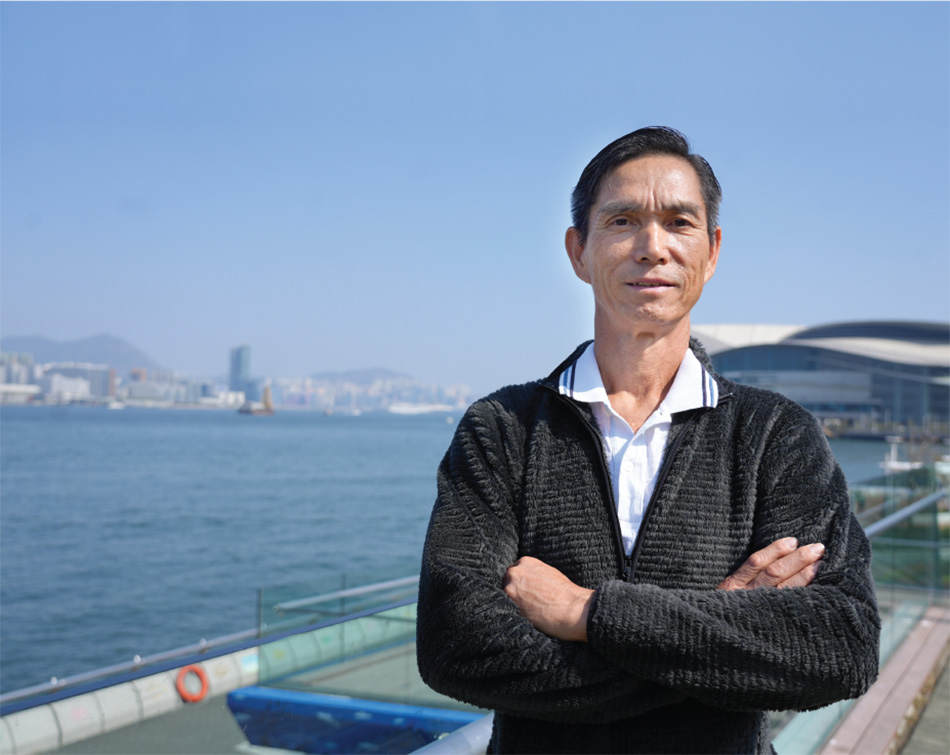
In 1981, Mr Chan, who was barely out of his teens, went fishing with two friends and saw a recruitment vehicle of the Fire Services Department by chance when they made their way through Jordan Road Ferry Pier. Thinking that there was no harm trying, he applied for the job along with his friends. He got recruited and began his six-month training for firemen. “At that time, I thought all that firemen had to do is to put out fires. Never did I realise that they also had to acquire knowledge and skills in various areas to cope with different tasks. After admission to the Fire Services Training School, not only did we have to undergo training, we also had to study and sit for exams. I thought of quitting. After all, there were ample job opportunities in those days.” Mr Chan recalled. Yet, being a competitive person, he held out and graduated from the training school as a fireman. In 2004, he was promoted to Principal Fireman, a post he held until his retirement in 2016.
Mr Chan held various posts during his 35-year career as a fireman. He was promoted to Senior Fireman in 1993 and was stationed at Sai Kung Fire Station. The geographical environment of Sai Kung is different from that of the urban area. With devotion to his job, Mr Chan soon became familiar with the relevant tasks and was deeply aware of how important firemen’s work was in rural areas.
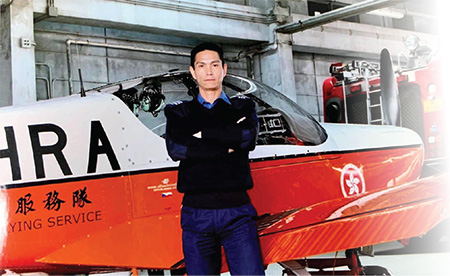
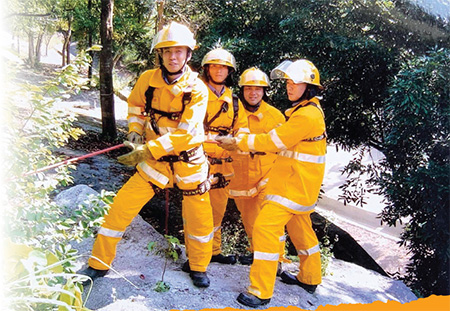
In 1996, Mr Chan was tasked with rescuing an expatriate doctor who suffered heat stroke while hiking. The doctor died eventually and the accident left Mr Chan with a sharp sense of the hidden dangers of hiking. “I wonder why a doctor with medical knowledge would die in the hills. It made me realise that hikers need to understand the risks involved and have the know-how to cope with emergencies in order to avoid accidents. My work in the rural areas of Sai Kung and the time I spent in the countryside gradually raised my safety awareness when taking part in countryside activities.”
Performing emergency rescue is the first and foremost duty of a fireman. Knowing that similar operations might have to be conducted, Mr Chan refused to stay idle. He made good use of his spare time to explore the hiking trails in Sai Kung and go to the library to collect information on common hiking accidents and first-aid treatment. On one occasion, Mr Chan came across a training team of Trailwalkers in the hills and found that one of them was already 60 years old. He thereupon wondered if he would be able to do the same thing at such age. Mr Chan recalled that the senior had encouraged him, saying that it was possible for him to become a Trailwalker if he started training at once. Since then, Mr Chan has spent his spare time exploring the hills in Hong Kong. As the days wore on, it took him shorter time to finish longer routes. Cross-country running became his new hobby and changed the rest of his life.
Mr Chan first formed a team to participate in the Trailwalker event in Hong Kong in 1996. The team completed the race in 18 hours and 33 minutes and was the tenth team to cross the finish line. His team’s performance improved by leaps and bounds in the ensuing year, finishing the race one hour and eight minutes earlier than they did before. However, Mr Chan refused to rest on his laurels. Instead, he stepped up training in the hope of winning the championship and breaking foreign teams’ monopoly on the top three spots. “I have never thought of giving up because I have already taken the first step. I have to soldier on no matter how hard it is,” he said. Pursuing their goal with endurance and zeal, Mr Chan’s team won three Trailwalker championships in a row from 1998 to 2000 and he was dubbed “Mr Trailwalker”.
Having acquired enough experience, Mr Chan started to participate in Trailwalker events overseas including Australia, New Zealand and Japan from 2000 onwards and scooped up the top prize every time. He also took part in the Marathon des Sables for seven times and made history by being the first Chinese athlete to reach the finish point. Long-distance running requires endurance and strong will. He shared his knack for overcoming challenges, “When getting tired out, we can allow ourselves to be distracted from discomfort by recalling happy or sad moments in our lives.”

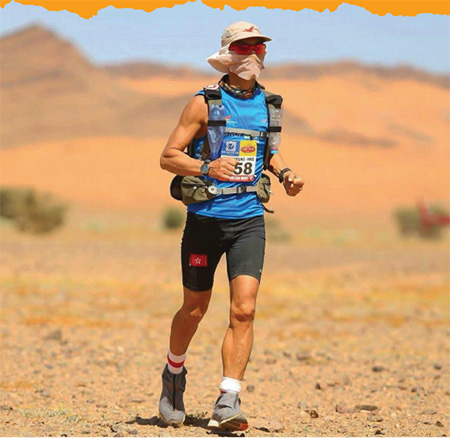
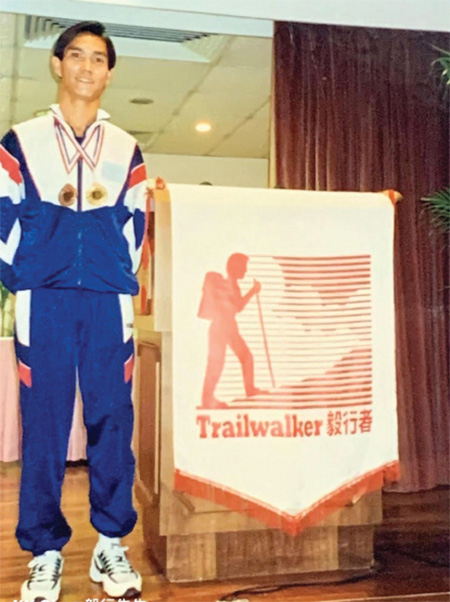
Mr Chan rose to fame after winning the Trailwalker competition held in Hong Kong for three consecutive years and people began asking “Mr Trailwalker” for advice. He commenced teaching on a voluntary basis through charitable organisations and founded “Trailwalker Teaching Room (TTR)” in 2010. He continued his voluntary teaching work after retirement in 2016 and had TTR registered as a charitable organisation in 2022 to provide courses on hiking and cross-country running to the general public. “The countryside is my best teacher. I have learnt a lot from Trailwalker activities and would like to share it with more people for their benefits.” Mr Chan said. He hopes everyone can observe safety and avoid danger while enjoying the fun of hiking.
Mr Chan passes on his skills in hiking and cross-country running to people of different ages. In particular, Mr Chan mentioned that he and his wife are fond of teaching children, in the hope of enhancing their physical capabilities and will, as well as their ethics and manner. “I want to help the little ones in particular those from grassroots and of ethnic minorities. Apart from hiking gear and transport subsidy, we also offer them after-class support to ensure that they are not bereft of sports training due to family situation. We arrange elite training for students with outstanding performance and sign them up for international competitions. Also a sexagenarian, Mr Chan offers classes designed for those who are 60 to 70 years of age. “We worked so hard to develop our careers when we were young, only to realise that health matters much more when we grow old. Those who want to improve health and fitness through hiking often face problems like lack of companion and instructor. My classes for the seniors aim to inspire them to increase physical activities.” Mr Chan stressed that the training for the seniors focuses more on cultivating their interests in doing exercise than improving the running speed, so as to make them more healthy.



Mr Chan remains busy after retirement as he has to juggle competition, teaching and charity work. He said with a smile that he had made many friends over the years and received invitations from time to time to share his experience in cross-country running. In this way, Mr Chan’s knowledge and experience has passed along and many people have benefited from this. Such a busy retirement life, which is utterly beyond imagination, is meat and drink to him.
Having witnessed many tragic moments during his 35-year stint as a firefighter, Mr Chan realised how precious life and health are. “I believe health is our greatest wealth; only a healthy person can savour life.” He reminds his fellow colleagues to plan early for post-retirement life, develop hobbies and turn exercise into a habit. In fact, nothing is more important than staying healthy and happy.
Mr Chan himself is a good example. The number of days he took sick leave during his career spanning over three decades as a firefighter was negligible. His constitution is extremely strong thanks to the many years he spent on cross-country running. His welltoned physique shows no signs of a retiree in his sixties. He quipped that he cannot bear having flab over his waistband; and doing exercise consistently is the only way to maintaining good health and physique. To Mr Chan, sports and charitable pursuits not only broadened his horizon and social circle but also spiced up his retirement life, making it more meaningful.
